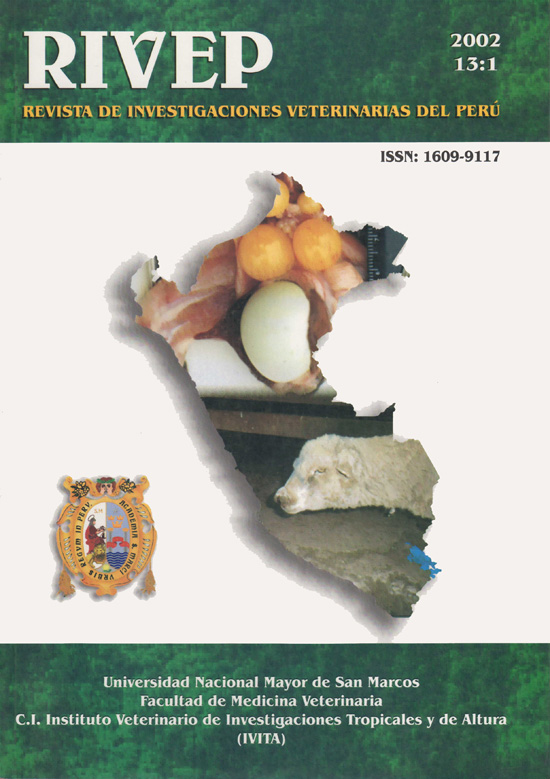FACTORES QUE AFECTAN LA PRODUCCIÓN DE LECHE EN VACAS DE DOBLE PROPÓSITO EN TRÓPICO HÚMEDO (PUCALLPA)
DOI:
https://doi.org/10.15381/rivep.v13i1.1703Keywords:
cows, milk yield, crossbred, feeding, lactation, reproduction, tropicsAbstract
The effect of feeding, crossbreeding level, lactation period, and reproductive status on milk yield was evaluated in dual purpose cows in the humid tropics of Peru. A total of 204 cows from 23 farms were monitored. All cows grazed over Brachiaria decumbens. Energy supplementation consisted of brewery residues and rice bran. Cows were grouped according to the level of European blood in Low, Medium, and High. Regression analysis and the “t” Student test were applied for statistical comparisons. The higher availability of B. decumbens had a negative effect on milk yield. Supplemented animals yielded more milk (5.2 kg/cow/day) than those non-supplemented (3.8 kg/cow/day). The level of European inheritance affected milk yield, where 50% crossbred cows had the highest milk yield (5.0 kg/cow/day). Month of lactation affected productive performance. Non-pregnant cows produced more milk than the pregnant ones (4.5 vs. 3.7 kg/cow/day). It is concluded that milk yield was affected by all variables under evaluation, especially the level of European blood.Downloads
Downloads
Published
Issue
Section
License
Copyright (c) 2002 Sonia Sheen R., Alfredo Riesco D.

This work is licensed under a Creative Commons Attribution-NonCommercial-ShareAlike 4.0 International License.
AUTHORS RETAIN THEIR RIGHTS:
a. Authors retain their trade mark rights and patent, and also on any process or procedure described in the article.
b. Authors retain their right to share, copy, distribute, perform and publicly communicate their article (eg, to place their article in an institutional repository or publish it in a book), with an acknowledgment of its initial publication in the Revista de Investigaciones Veterinarias del Perú (RIVEP).
c. Authors retain theirs right to make a subsequent publication of their work, to use the article or any part thereof (eg a compilation of his papers, lecture notes, thesis, or a book), always indicating the source of publication (the originator of the work, journal, volume, number and date).



